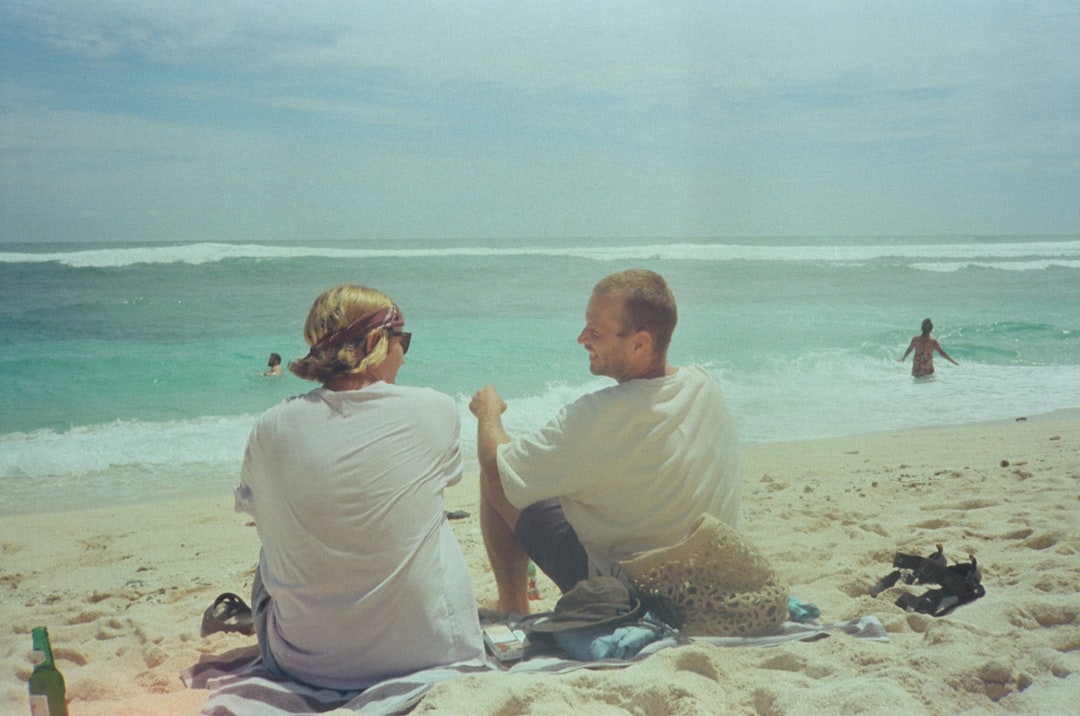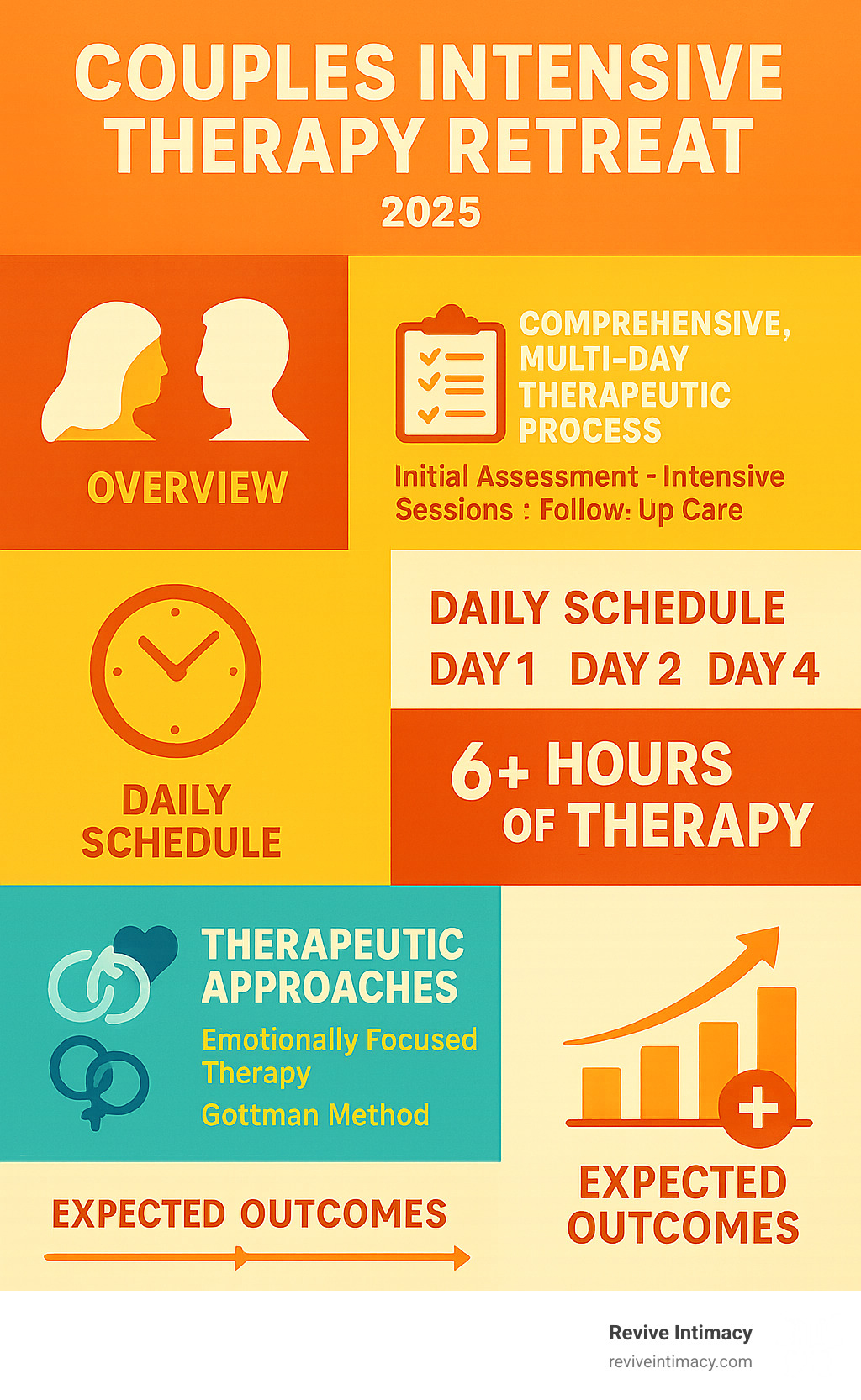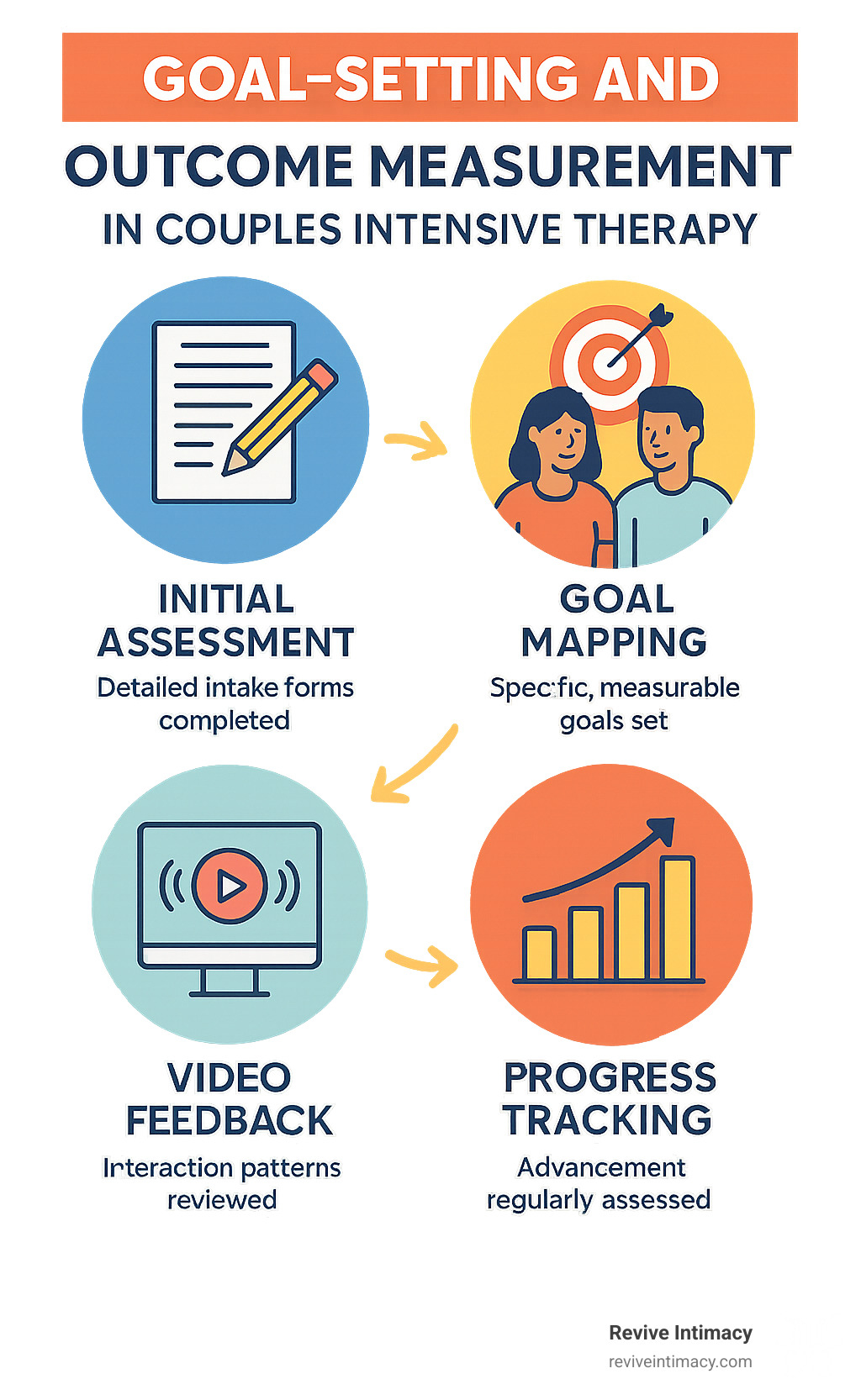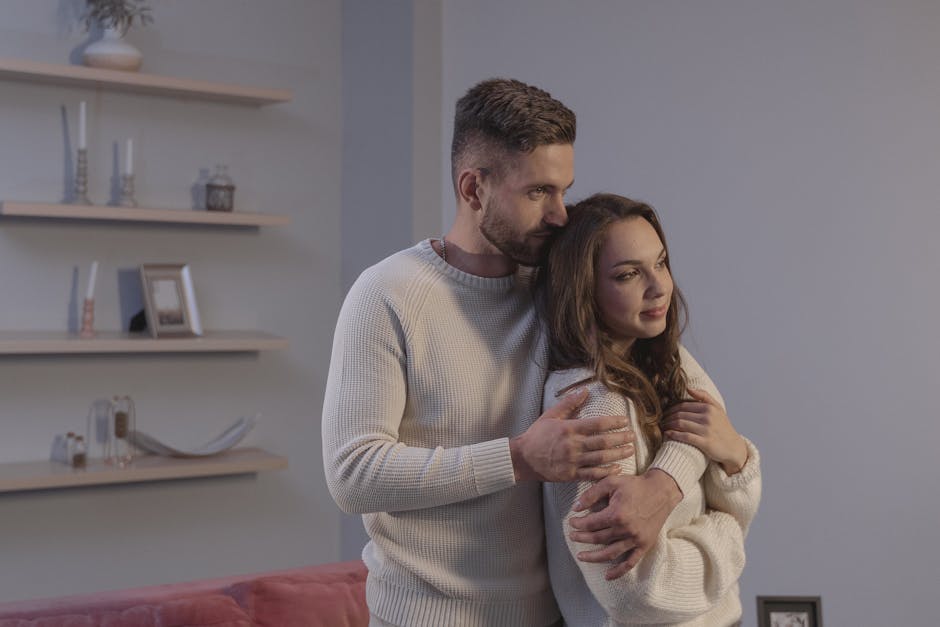Couples Intensive Therapy Retreat: 5 Powerful Benefits in 2025
When you’re caught in painful relationship cycles, waiting months for breakthrough moments can feel impossible. As a solo therapist specializing in couples therapy retreats in Austin, I understand the frustration of making progress in therapy sessions only to lose momentum between appointments. A couples therapy retreat offers a concentrated alternative that delivers profound results in days rather than months.
What Makes a Couples Therapy Retreat Different
Picture this familiar scenario: You finally open up about a deep relationship issue during therapy, feeling vulnerable but hopeful as you begin making progress. Then comes the inevitable “We’ll need to wrap up for today, but let’s continue next week.” By your next appointment, daily life has taken over—work deadlines, household responsibilities, daily stresses—and you’re essentially starting from square one.
Couples therapy retreats at Revive Intimacy eliminate this stop-and-start rhythm by providing 12-30 hours of focused therapeutic work delivered over 2-5 consecutive days. This concentrated approach creates what I call “therapeutic momentum”—that powerful moving forward that happens when healing isn’t constantly interrupted by daily life.
Research demonstrates that Emotionally Focused Therapy, commonly used in therapy retreat formats, achieves a 70-75% success rate in helping couples move from distress to recovery. The retreat structure allows us to build on each breakthrough immediately, creating lasting change through uninterrupted focus on your relationship.
The Science Behind Accelerated Healing
The effectiveness of a marriage retreat lies in its ability to create immersive experiences that traditional therapy sessions cannot match. When couples have consecutive days of therapeutic work, they experience breakthrough moments that might take months to achieve in traditional formats.
During couples therapy retreats, we utilize evidence-based approaches including Emotionally Focused Therapy and trauma-informed care techniques. This approach helps couples learn to dance together instead of stepping on each other’s toes, building a stronger emotional connection in their romantic relationship.
The concentrated timeframe allows for comprehensive assessment, immediate skill practice, and real-time feedback. Instead of discussing communication techniques you’ll “try at home,” you experience new approaches immediately with guidance and support. This immediate application creates confidence and competency that transfers into daily life, helping you develop new skills for your relationship.
Who Benefits Most from Couples Therapy Retreats
Couples therapy retreats serve diverse relationship challenges, but certain situations particularly benefit from this concentrated approach:
High-conflict couples who find themselves stuck in repetitive argument cycles often experience significant breakthroughs through retreat work. The extended time allows us to identify destructive patterns and practice new responses without the frustration of weekly interruptions.
Busy professionals struggling to maintain therapy momentum due to demanding schedules find couples retreats particularly valuable. Between work travel, family responsibilities, and professional demands, maintaining weekly therapy sessions becomes nearly impossible. The retreat format allows these couples to prioritize their relationship without constant life interruptions.
Married couples healing from infidelity benefit from the careful, sustained work that affair recovery requires. Rebuilding trust isn’t something that happens in neat 50-minute increments—it demands deep, concentrated attention to the complex emotions involved in betrayal and healing.
Partners navigating major life transitions such as becoming parents, career changes, health challenges, or other significant shifts often find retreat work helps them process how these changes affect their bond and move forward together.
Emotionally disconnected couples who feel like roommates rather than romantic partners benefit from the concentrated time needed to explore what created this distance and rebuild their emotional connection.
In my practice serving the Austin, Lakeway, Westlake, and Bee Cave communities, I work with couples and individuals ages 25 and older who are intelligent, self-aware, and receptive to feedback. Many couples are IT professionals, healthcare workers, and young parents who value evidence-based approaches to relationship healing.
What to Expect During Your Therapy Retreat Experience
A couples therapy retreat unfolds as a carefully structured journey designed around your unique relationship needs. The experience typically spans 2-5 days, with each element building on the previous work.
Comprehensive Assessment: We begin with thorough evaluation tools that go far beyond typical intake questionnaires. This detailed assessment creates a complete picture of your relationship’s unique landscape, allowing me to customize every aspect of your therapy retreat to your specific needs.
Personalized Treatment Planning: Based on your assessment results, we develop a tailored roadmap that addresses your particular challenges and goals. Whether you’re dealing with communication breakdowns, sexual intimacy challenges, affair recovery, or exploring alternative relationship structures, your retreat addresses your specific situation.
Mixed Session Format: The retreat includes both joint couple sessions and individual therapy sessions. Joint sessions focus on communication patterns, conflict resolution, and rebuilding connection. Individual sessions provide safe space for each partner to explore personal history, individual challenges, or sensitive topics that might feel too vulnerable to discuss initially together.
Immediate Skill Practice: Unlike traditional therapy where you discuss techniques to try at home, retreat work allows for immediate practice and feedback. We can work through actual relationship problems as they arise, helping you develop more effective ways of expressing needs and hearing your partner’s perspective.
Flexible Structure: While we maintain a structured approach, the schedule remains flexible to follow your natural healing process. If you’re experiencing a breakthrough moment, we don’t stop because the clock indicates session time is over.
Weekend Marriage Retreat: Concentrated Healing
For many couples, a weekend marriage retreat provides the perfect balance of concentrated work and manageable time commitment. These weekend retreats deliver significant relationship improvements in a short period, making them ideal for busy couples who want to dive deep into their relationship work.
A weekend retreat typically includes 12-15 hours of focused therapy spread across Friday evening through Sunday afternoon. This format allows couples to step away from daily responsibilities and create a distraction-free environment for healing and growth.
The beauty of a weekend marriage retreat lies in its ability to create what feels like an incredible opportunity for transformation. Many couples report feeling like they’ve experienced life-changing breakthroughs in just one weekend—progress that might have taken months in traditional therapy.
Common Issues We Address in Couples Retreats
Through couples therapy retreats, we can effectively address the complex relationship challenges that bring couples to seek help:
Communication Breakdown: “We still love each other but cannot seem to communicate. It feels like we’re becoming roommates.” The retreat format provides concentrated time to identify communication patterns and practice new approaches immediately.
Sexual and Intimacy Challenges: “We’ve been together for 20+ years. We enjoy spending time together but have no sexual relationship.” The private, focused therapy environment allows for vulnerable exploration of sexual intimacy issues, including sexual dysfunction, desire discrepancies, and physical intimacy concerns.
Infidelity Recovery: “Infidelity has torn our relationship apart, but we still want to make this work. I’m trying hard to trust again.” The concentrated time allows for careful processing of betrayal and systematic work on rebuilding trust while addressing any ongoing affair concerns.
Alternative Relationship Structures: “We’re exploring non-monogamy but my spouse doesn’t seem fully committed.” The retreat format provides safe space to explore these complex dynamics thoroughly.
Grief and Loss: Couples affected by infertility challenges, loss of children, or other significant losses benefit from the sustained attention that grief work requires through family therapy approaches.
Family Dynamics: Coparenting challenges, blending families, and navigating relationships with teenagers or young children can be addressed comprehensively through retreat work that may incorporate family therapy techniques when appropriate.
The Intake Process: Your Journey Begins
The therapy retreat process starts with a thoughtful intake designed to create a supportive foundation for our work together. After you reach out, we’ll schedule an initial consultation where I learn about what’s bringing you in, explore your goals, and share how the retreat process works.
Before our first session, you’ll complete a comprehensive intake form covering your relationship background, individual histories, and current challenges. This information helps me as your couples therapist understand your unique situation and develop a personalized treatment plan.
For couples therapy retreats, I typically see the couple together first to assess your relationship’s current state and establish immediate and long-term goals. The following sessions include individual meetings with each partner to gather personal, relational, and family history. Subsequent sessions focus on joint work addressing the core issues we’ve identified together.
This therapy process remains flexible and grounded in trust, curiosity, and mutual respect. The goal is creating a therapeutic environment where both partners feel safe to explore vulnerabilities and practice new ways of connecting in their romantic relationship.
After Your Retreat: Sustaining Progress
The real work of a therapy retreat often continues after the formal sessions end. The retreat provides tools, insights, and old patterns awareness, but integrating these changes into daily life requires ongoing commitment and practice.
Once care has been established through your couples counseling retreat, you can expect consistent, supportive follow-up that’s tailored to your evolving needs. Sessions focus on the goals we’ve identified together while allowing space for new insights or challenges that arise. I provide a mix of reflection, practical tools, and accountability, always aiming to help you grow in self-awareness and move toward meaningful change.
Between sessions, you might receive worksheets or journaling prompts via email. These aren’t homework assignments but invitations to deeper reflection and practice. You can bring them back to process in follow-up sessions or use them for personal reflection.
Regular check-ins help maintain momentum and address challenges as they emerge. These follow-up sessions are crucial for long-term success and help sustain the healing process initiated during your retreat experience.
Marriage Counseling Through Retreat Formats
Marriage counseling through retreat formats offers unique advantages for married couples seeking to strengthen their relationship. Unlike traditional weekly appointments, a marriage retreat creates an intimate setting where couples can focus entirely on their relationship without outside distractions.
The retreat approach to marriage counseling allows therapists to dive deep into relationship dynamics, helping couples identify areas that need attention and develop strategies for building a healthy relationship. This concentrated format often proves more effective than spreading the same work across months of traditional therapy.
Whether you’re newlyweds facing early relationship challenges or long-term partners working to rebuild connection, marriage retreats provide the focused attention your relationship deserves. The immersive experience helps couples move beyond surface-level issues to address deeper patterns that impact their emotional bond.
When Therapy Retreats May Not Be Appropriate
Being transparent about limitations is essential in therapeutic work. Couples therapy retreats aren’t suitable for all situations, and recognizing when other forms of treatment might be more appropriate ensures ethical, effective care.
Active abuse makes retreat couples work inappropriate and potentially dangerous. If there’s ongoing physical, emotional, or psychological abuse, individual safety planning and specialized resources need to come first. Similarly, if there’s an ongoing affair that hasn’t been addressed, retreat work isn’t suitable until this issue is resolved.
Unmanaged addiction requires individual therapy attention before couples work can be effective. Whether substance abuse or behavioral addictions, these issues need stabilization before relationship work can take hold.
If either partner is experiencing acute mental health crisis—severe depression, active suicidal thoughts, or other serious individual challenges—individual stabilization becomes the priority. When couples feel overwhelmed by individual issues, the retreat format may feel overwhelming rather than helpful.
Most importantly, retreat work requires genuine commitment from both partners. If one partner isn’t truly willing to engage in the therapy process, the retreat format won’t be effective. This concentrated work requires both partners to be present, engaged, and willing to be vulnerable.
Questions to Consider Before Your Couples Retreat
Before committing to a couples therapy retreat, having an open conversation helps ensure the right fit. Consider these important questions:
What specific relationship problems are you hoping to address? Whether communication breakdown, intimacy issues, affair recovery, or other concerns, clarity about your goals helps determine if retreat work is appropriate.
Are both partners genuinely committed to the process? Retreat work requires vulnerability and engagement from both people. If one partner is being pressured into therapy, the format won’t be effective.
What does success look like for your relationship? Understanding your vision for improvement helps guide the retreat focus and creates measurable goals for progress.
How will you maintain boundaries during the retreat? This means arranging reliable childcare, taking time off work, and creating space away from daily responsibilities.
Choosing Between Weekend and Extended Retreats
Many couples wonder whether a weekend retreat or extended retreat format works better for their situation. Both options offer significant advantages, and the choice often depends on your specific needs and circumstances.
Weekend retreats work well for couples with busy schedules who want concentrated relationship work without taking extensive time away from responsibilities. These retreats pack substantial therapeutic work into a manageable timeframe, often delivering breakthrough moments in just one weekend.
Extended retreats spanning 3-5 days allow for even deeper exploration of complex relationship dynamics. Couples dealing with significant relationship trauma, complex family dynamics, or multiple interconnected issues often benefit from the additional time that extended retreats provide.
As your therapist, I can help you determine which retreat format best serves your relationship’s unique needs during our initial consultation.
Making the Investment in Your Relationship
Seeking help for your relationship isn’t a sign of failure—it’s a sign of commitment to something valuable. It demonstrates that you believe your relationship is worth investing in, worth the time and energy that healing requires.
The retreat format isn’t right for everyone, but for couples ready to commit to the process, willing to be vulnerable, and motivated to create lasting change, couples therapy retreats can be truly transformative. The concentrated time allows for deep work that can shift patterns, heal wounds, and rebuild connection in ways that might take months or years to achieve otherwise.
My approach combines evidence-based techniques with warmth and compassion, creating safe spaces where couples can explore their relationship patterns and build stronger connections. As a solo therapist, I provide personalized attention that honors your relationship’s unique needs and circumstances.
If you’re considering this path, I encourage you to reach out for a consultation. We can discuss your specific situation, explore whether a retreat format would benefit your relationship, and create a plan that supports your goals. The journey toward deeper connection and healing is worth taking, and you don’t have to take it alone.
For other couples in Austin, Lakeway, Westlake, and Bee Cave who are ready to invest in their relationship’s future, couples therapy retreats offer hope, tools, and the concentrated attention needed to create lasting change. Your relationship deserves this focused care and attention.
The next chapter of your relationship story is waiting to be written, and it can be one of healing, growth, and renewed connection. Contact Revive Intimacy Couples Counseling today to learn more about how our couples therapy retreats can transform your relationship and help you rediscover the connection you’ve been seeking.










